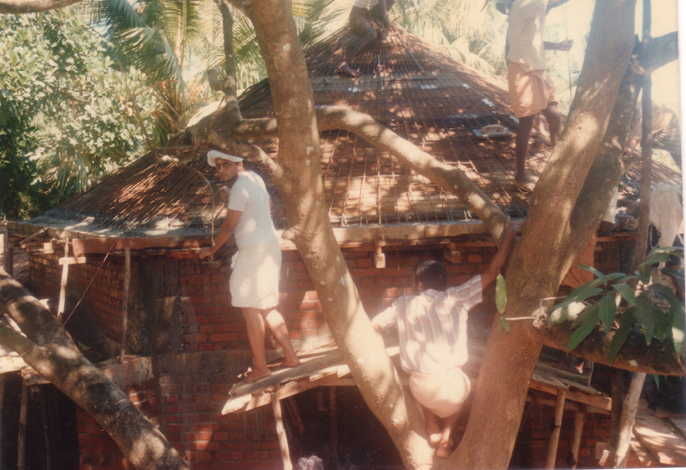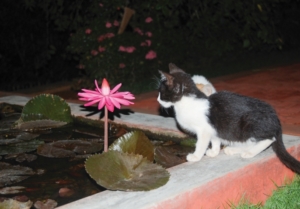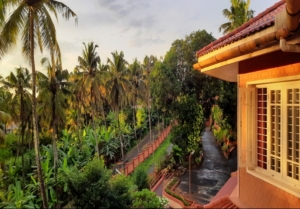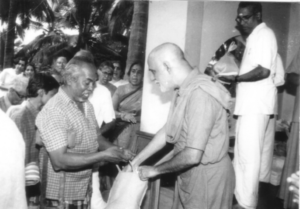Ashram Diary
Remaining afloat over Likes and Dislikes
Swami Nirviseshananda Tirtha

As Swamiji was resting on his recliner, we were sitting at his feet. I raised the point about the sādhanā of transcending likes and dislikes. He said, “Good things will be liked. Bad things will be disliked. But, you must not run after what you like, and hate or avoid what you dislike.”
One evening we found Swamiji speaking fervently (almost angrily) to a group of young arrogant villagers, who were involved in some grave immoral act. He was standing in the verandah and the boys were outside. Seeing the intensity of his voice and gestures, we felt quite concerned – those days, we did not understand Malayalam. Swamiji could feel my mind. He suddenly walked towards me and whispered: “Don’t worry; I am only trying to put some sense in them. I have called them here for that purpose.” Immediately he went back to them and continued vociferously.
The event may appear to be simple, but it opened a new horizon before me. I thought: “Will I ever deliberately face these people? Any peace-loving person would rather try to avoid such an encounter than to call it upon himself willfully. Then how is it that a Saintly person like Swamiji had called these boys and was speaking to them ‘angrily’? Normally, anybody would be hesitant and even fearful imagining the possible response! And, according to usual belief, should not a Saint always speak with visible peace and love?”
I understood the meaning of transcending likes and dislikes. I understood the meaning of overcoming the bondage created by sattva-guna – “sukha-saṅgena badhnāti jñāna-saṅgena cānagha” (Sattva-guna binds a person by his preference or clinging to peace and knowledge. Bhagavad Gita-14.6). The event also taught me the meaning of real love for people. It is not always to speak to them “lovingly”; it is often to sacrifice one’s peace and saintly image for their real welfare.
That was the time we were contemplating on renouncing our profession and home to join the Ashram and serve Swamiji and Mataji Sulabha Devi. This event laid open the next phase of sādhanā before me. I had done enough of meditation, and studied the scriptures with enough dedication. It became clear to me that the sādhanā after coming to the Ashram would be to transcend the likes and dislikes. I knew that service to the Guru gives the best opportunity for this. But I did not know how difficult it would be in practice!
A few days later, after dinner, as Swamiji was resting on his recliner, we were sitting at his feet. I raised the point of my new enlightenment about the sādhanā of transcending likes and dislikes. He said, “Good things will be liked. Bad things will be disliked. But, you must not run after what you like, and hate or avoid what you dislike.”
“People think that a Knower should not have sukha-duhkhas. If sukha duhkhas are not there for him, then where is the question of having samatvā – remaining equal or even-minded – in sukha-duhkhas?” After a while he said, “You know, it is like swimming in water. If there is no drowning power of water, will there be any joy in swimming? Will not swimming become meaningless? To swim, you must learn the art of remaining afloat by neutralizing the drowning power of water.”
Again, it opened up a new horizon before me. The interactional sādhanā (the term was coined years later) was coming to life. That night, I wrote about this enlightenment with tears of gratitude soaking the pages of my diary. Long back, I had asked a Mahatma: “Will not the Jnāni have sorrows?” He had smiled and replied: “Yes my son, certainly he has, but he does not identify himself with them.” The illustration of swimming introduced me to a new dimension of a Knower who remains tremendously active in the world never getting overwhelmed or tainted by worldliness. It is not keeping away from the waves, but floating joyfully over the waves.
But, the test of knowledge was not that easy. Soon after we joined the Ashram, Swamiji told me one day: “For quite some time we have not taken up any construction. Nobody was here. Now that you have come, I would like to take up some construction.”
It was a shock! If anything on earth I disliked, it was construction. How did Swamiji know about it? Or, is it the inscrutable way of Mother Nature?
Mataji Sulabha Devi used to say: “Your Swamiji is a construction engineer, and we do not have any maintenance engineer here.” Soon I was on the job, as construction as well as maintenance engineer. Additionally as the architect, which role perhaps I did not dislike. Thirty-three years have passed; I am still waiting to pass on the baton.
-From Vicharasethu –May 2013
If there is no drowning power of water, will there be any joy in swimming? Will not swimming become meaningless? To swim, you must learn the art of remaining afloat by neutralizing the drowning power of water.
The illustration of swimming introduced me to a new dimension of a Knower who remains tremendously active in the world never getting overwhelmed or tainted by worldliness. It is not keeping away from the waves, but floating joyfully over the waves.
 1121 views
1121 views

 Add to Favorites
Add to Favorites Add to Reading List
Add to Reading List











